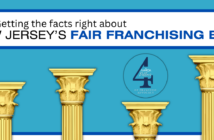by JEFFREY M. GOLDSTEIN
Many franchisees believe the law will protect them from being terminated if they have failed to perform all their franchise obligations due to COVID-19, but that’s not always correct. Now that the worst of COVID appears to be behind us, many businesses are moving toward reinstating normal expectations, standards, and requirements. In the franchise world, this means that although many franchisors adjusted operations to allow franchisees more operational leeway, they now appear ready to rigorously enforce system standards.
In general, a franchisee that failed to perform under a contract or franchise agreement points to two general, related-but-different defenses: First, most agreements have force majeure clauses that are set forth explicitly as a term in a contract; and second, some states have common-law doctrines of impossibility, impracticability, and frustration of purpose.
Although every force majeure clause is different, they all share the notion that an unanticipated third-party event has prevented or impeded the ability of a party to complete performance under a contract. For instance, the inability-to-travel and government-closure orders might suffice as force majeure events. Interpreting the language of such contracts is a complex undertaking, and you should rely on a seasoned litigator with many years of complex litigation experience to provide accurate answers. Moreover, even when a lawyer can tether your case to a force majeure incident, some courts may require a breaching franchisee to show that it took reasonable and timely measures to mitigate the impact on that franchisee’s contractual performance.
Where there is no force majeure clause in the relevant agreement, the party searching for a legal excuse for the failure to perform due to COVID-19 will have to look at older common-law doctrines, such as impossibility, impracticability, and frustration of purpose.
The doctrine of impossibility holds that if it becomes impossible for one of the parties to a contract to meet and complete its contractual obligations, that promising party will be discharged or excused from having to carry out its obligations under the contract thereafter. This doctrine, however, is exceedingly restrictive and almost never applied. For example, in the case of a hotel franchise agreement, some courts would not apply the impossibility doctrine per se unless the hotel was literally demolished.
Courts have begun to loosen (but only a bit) the rigidity of the impossibility doctrine to allow a party to extricate himself /herself from a contract where an event made the performance of the promising party “almost impossible” or impracticable. Under the impracticability doctrine, where a supervening event makes performance become overly burdensome, although technically possible, the failure to perform will be discharged.
BUT WHAT ABOUT…?
Another legal excuse that evolved to allow a similar type of contractual discharge is known as the frustration of purpose doctrine. This focuses on the purpose of the breaching party for having signed the agreement rather than the destruction of the property that would be used for carrying out the contract. For instance, if a party leases an apartment for a few days in NYC to watch the Macy’s Thanksgiving Day Parade, and a week before the parade, all of the parade-masters are taken hostage requiring the parade to be cancelled, although it would still be possible for the lessee to physically sit in the apartment, the purpose in having rented the apartment would have been entirely frustrated and excused.
Franchisees must watch out for the situation where they receive poor legal advice to the effect that COVID-19 by itself always authorizes a franchisee to sue its franchisor for breach of contract merely because the franchisor attempts to collect on fees due under the franchise agreement. Further, some courts impose a rigorous causation requirement on a franchisee asserting an impossibility-type claim. Recently, a federal court in Massachusetts rejected a distributor’s force majeure claims embracing such reasoning.
Even in cases where a nonperforming party can anchor his claim in a force majeure or impossibility excuse, it may nevertheless be incumbent on the party to muster significant proof of related issues, including causation, mitigation, and damages. Further, as the business world escapes from lockdown, it is likely courts will be called upon to determine the legal impact of informal understandings reached between franchisors and franchisees during the darkest days of COVID-19. Many of these understandings will be informal, oral, non-specific, and not bargained for, which makes such understandings difficult to enforce to the extent they aren’t found to be waivers or modifications.
 Jeffrey M. Goldstein, Esq., is an attorney with Goldstein Law Firm, one of only four national franchise law firms in the country that represent exclusively franchisees and dealers. His practice covers prolific and myriad commercial complex litigation matters, and he is regularly sought out by franchisees and dealers from foreign countries (e.g., UAE, South America, United Kingdom) to represent them in disputes with United States franchisors and suppliers. He can be reached at [email protected] or 202-293-3947 or www.goldlawgroup.com.
Jeffrey M. Goldstein, Esq., is an attorney with Goldstein Law Firm, one of only four national franchise law firms in the country that represent exclusively franchisees and dealers. His practice covers prolific and myriad commercial complex litigation matters, and he is regularly sought out by franchisees and dealers from foreign countries (e.g., UAE, South America, United Kingdom) to represent them in disputes with United States franchisors and suppliers. He can be reached at [email protected] or 202-293-3947 or www.goldlawgroup.com.
What would a litigator address?
- Can the breaching party establish a causal link between COVID-19 and the party’s failure to perform?
- Did the agreement implicitly or explicitly exclude foreseeable events? For example, while COVID-19 may not have been foreseeable before 2019, it surely will be now.
- Does the force majeure provision explicitly list COVID-19 or a pandemic?
- Does the force majeure clause set forth any type of catch-all language that could include COVID-19, such as “an act of god” or “other like events”?




